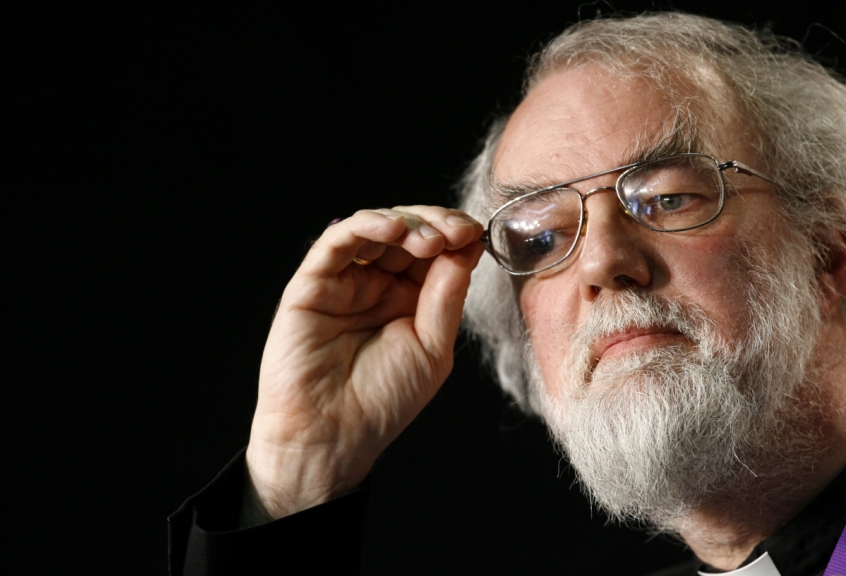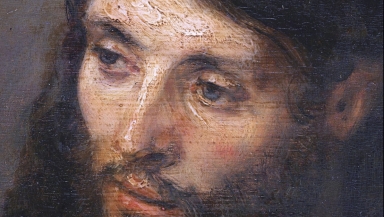
When we go into a Christian place of worship, we expect to see a cross. And when crosses are removed from public places, such as crematoria or hospital chapels, we quite reasonably get rather indignant about it. But in the world in which Christianity began, a place of worship was the last place you would expect to see a cross. We can only begin to get some sense of what it might have felt like to encounter the symbol of a cross in the first couple of Christian centuries if we imagine coming into a church and being faced with a large picture of an electric chair or perhaps a guillotine. The cross was a sign of suffering, humiliation, disgrace. It was a sign of an all-powerful empire that held life very cheap indeed: a forceful and immediate reminder to everybody that their lives were in the hands of the state. You might well be used to seeing crosses on the outskirts of towns or by the side of the road, but most definitely not in any place of worship.
When Jesus was a small boy there was a revolt in Galilee that was brutally suppressed by the Romans. We're told that there were thousands of crosses by the roads of Galilee. When in the Gospels Jesus speaks of picking up your cross and following him, he is not using a religious metaphor for things becoming a bit more difficult.
So a group of people who proclaimed that the sign of their allegiance was a cross had a lot of explaining to do; and so we will be looking at some of the ways in which the first Christians tried to explain themselves. Because once we get past the surface level of being used today to seeing crosses around as a religious symbol, once we let ourselves recognize what it is we are looking at, we are bound to be faced with some of the same questions. What is this about? How does it work? Why do we have an instrument of torture at the centre of our imagination?
The early Christians must have felt that they had no option but to talk about the cross. They knew that because of the death of Jesus on the cross their universe had changed. They no longer lived in the same world. They expressed this with enormous force, talking about a new creation, about liberation from slavery. They talked about the transformation of their whole lives and they pinned it down to the events that we remember each Good Friday. They couldn't get away from the cross – or so at least the New Testament seems to imply. There are in fact some New Testament scholars who try to argue that reflection on the cross of Jesus came a little bit later. First came Jesus the charismatic teacher, the wandering prophet; first came an interest in his words rather than his deeds or his sufferings. And yet, when you read the earliest texts of Christian Scripture, not only the Gospels, it's difficult to excavate any stratum of thinking that is, as you might say, 'pre-cross'. Pretty well everything we read in the New Testament is shadowed by the cross. It is, first and foremost, the sign of how much has changed and how it has changed.

Even non-Christians in the world around recognised the central importance of the cross to Jesus' early followers. The earliest picture we have of the crucifixion is scratched on a wall in Rome; it may be as old as the second century. It is a rather shocking image: a man with a donkey's head strapped and nailed to a cross, and next to the cross a very badly drawn little figure wearing the short tunic of a slave, and scribbled above it, 'Alexamenos worshipping his god'. Presumably one of Alexamenos's fellow slaves had scrawled this little cartoon on the wall to make fun of him. But he knew, as Alexamenos knew, that Alexamenos' god was a crucified God.
The first Christians had some explaining to do; and so do we. In one of the great Christian poems of the twentieth century (the second of the Four Quartets) T. S. Eliot writes , 'Again, in spite of that, we call this Friday good.' That's the agenda for our reflections in this chapter: why is this instrument of suffering and death a sign of what is good?
The early Christians were at a huge disadvantage. They claimed that the world had changed because somebody had been executed by a death normally reserved for slaves and rebels. They were saying that their new life depended on somebody who had been so much at odds with the Roman world that the full force of the empire had crushed him. That might not in itself have been fatal if it had been possible to say that he died because he was defending his nation and his faith. In the couple of centuries just before the birth of Jesus, the Jewish people had begun to develop theories about martyrdom. They had come to believe that when somebody died for the law and for the nation, that person's death was pleasing to God: there's a phrase from a text of that time, affirming that 'God considers the soul of a man to be a worthy sacrifice.' But Jesus did not die defending the nation or the law against foreign oppression. He died because those who ruled his nation had collaborated with the oppressor. The early Christians were thus caught in a sort of pincer movement: here was somebody condemned by the state and rejected by the religious authorities of his own people. So imagine you're an early Christian and this is your sign. What is it a sign of?
This extract is taken from God with Us: The meaning of the cross and resurrection – then and now by Rowan Williams (out Thursday 19<sup>th January 2017) with kind permission of SPCK (www.spck.org.uk)













